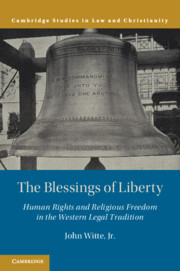Book contents
- The Blessings of Liberty
- Law and Christianity
- The Blessings of Liberty
- Copyright page
- Dedication
- Epigraph
- Contents
- Preface and Acknowledgments
- Introduction
- 1 Christian Contributions to the Development of Rights and Liberties in the Western Legal Tradition
- 2 Magna Cartas Old and New
- 3 Natural Law and Natural Rights in the Early Protestant Tradition
- 4 “A Most Mild and Equitable Establishment of Religion”
- 5 Historical Foundations and Enduring Fundamentals of American Religious Freedom
- 6 Balancing the Guarantees of No Establishment and Free Exercise of Religion in American Education
- 7 Tax Exemption of Religious Property
- 8 Faith in Strasbourg?
- 9 Meet the New Boss of Religious Freedom
- Concluding Reflections Toward a Christian Defense of Human Rights and Religious Freedom Today
- Index
3 - Natural Law and Natural Rights in the Early Protestant Tradition
Published online by Cambridge University Press: 28 October 2021
- The Blessings of Liberty
- Law and Christianity
- The Blessings of Liberty
- Copyright page
- Dedication
- Epigraph
- Contents
- Preface and Acknowledgments
- Introduction
- 1 Christian Contributions to the Development of Rights and Liberties in the Western Legal Tradition
- 2 Magna Cartas Old and New
- 3 Natural Law and Natural Rights in the Early Protestant Tradition
- 4 “A Most Mild and Equitable Establishment of Religion”
- 5 Historical Foundations and Enduring Fundamentals of American Religious Freedom
- 6 Balancing the Guarantees of No Establishment and Free Exercise of Religion in American Education
- 7 Tax Exemption of Religious Property
- 8 Faith in Strasbourg?
- 9 Meet the New Boss of Religious Freedom
- Concluding Reflections Toward a Christian Defense of Human Rights and Religious Freedom Today
- Index
Summary
Massachusetts was the last of the original thirteen American states to disestablish religion. Its 1780 constitution guaranteed freedom and equality to all peaceable private religions but also retained a “mild and equitable establishment” featuring (1) ceremonial public religious language, symbols, rituals, and oaths, (2) moral instruction in state schools, and 3) state collection of tithes and required religious worship. Lead draftsman John Adams crafted this approach as a political compromise between hardline establishmentarians and radical separationists in his day. But this view also reflected his belief that too little religious freedom is a recipe for hypocrisy and impiety, while too much religious freedom is an invitation to depravity and license. After 1780, this compromise fell apart as religious pluralism and political division over religion grew in the state. Amendments of 1821 and 1833 outlawed religious test oaths, mandatory worship, and state tithe collections, but the state retained its ceremonial and moral establishments.
Keywords
- Type
- Chapter
- Information
- The Blessings of LibertyHuman Rights and Religious Freedom in the Western Legal Tradition, pp. 76 - 104Publisher: Cambridge University PressPrint publication year: 2021



